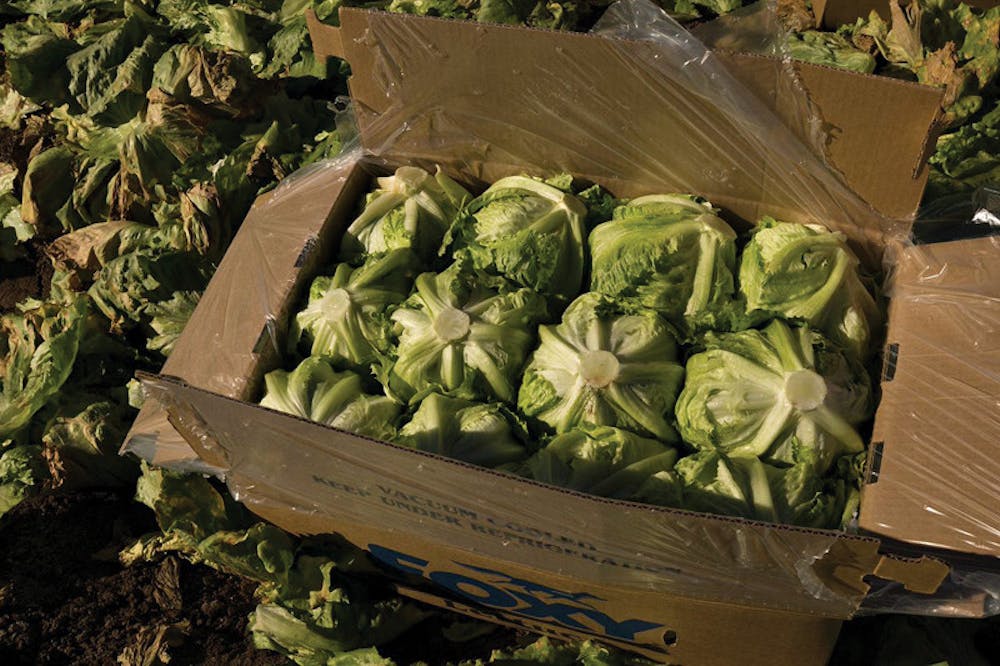Legislation introduced Jan. 15 would require genetically engineered products in Rhode Island to be clearly labeled “produced with genetic engineering,” and would also specify what the term “genetically engineered product” — which has multiple definitions — would mean in the state. Rep. Raymond Hull, D-Providence and Rep. Dennis Canario, D-Portsmouth, Little Compton, Tiverton separately introduced legislation on genetically modified organisms, though the two will likely collaborate in the future, Hull said.
Similar bills have been passed in Maine and Connecticut but will not take effect until comparable legislation is passed in other states, according to a General Assembly press release. For the bill proposed in Maine to take effect, five nearby states must pass similar legislation, while Connecticut’s law is contingent on the passage of GMO bills in enough northeastern states so that their combined populations include 20 million residents, according to the press release.
The announcement of Rhode Island’s bill arrives during a period of increased media scrutiny of GMOs, following the Jan. 13 dissolution of the European Union-wide ban on genetically modified farming, which allowed national governments to impose their own restrictions.
“I’ve introduced this bill for four years,” Hull said. “It gets just so far and then it stops. But there is more momentum now than there has been in the past. We’re very optimistic.”
The U.S. Department of Agriculture, which regulates the disclosure requirements of foods, declares that there is no meaningful difference between GMO and non-GMO foods.
The department also sets standards for labeling of ingredients, including artificial flavors, colors, preservatives and sweeteners. It stipulates that fruit juices must be labeled “fresh” or “made from concentrate,” and producers are not allowed to use the term “juice” if the product is not made of 100 percent juice. It also mandates that specific labels such as “fresh,” “frozen,” “fresh frozen” and “frozen fresh” be assigned to products such as peas.
Around the country and in Rhode Island, labels exist to specify non-GMO foods and certified organic foods, which by definition are not genetically modified.
Studies have shown that genetically modified crops may exhibit increased drought resistance, higher pesticide tolerance and increased nutritional content.
“We are moving into a world that is more food-stressed over the next 50 years due to climate change and population growth,” said Rep. Arthur Handy, D-Cranston, a co-sponsor of Hull’s bill and chairperson of the House Environment and Natural Resources Committee. “Genetically modified foods may play a roll in combating this stress.”
Other studies link genetically modified foods to decreased antibiotic efficacy, more frequent use of pesticides and unapproved food additives and allergens.
The longterm implications of genetically modified foods may be difficult to foresee since they have only been around for a few decades. “There have been no longitudinal studies conducted on the health impacts of genetically engineered foods on humans,” said Jim Leahy, executive director of Citizens for GMO Labeling, a grassroots movement dedicated to labeling genetically modified products.
Approximately 70 percent of supermarket foods contain genetically modified ingredients, according to the U.S. Department of Agriculture.
“I think that consumers ought to have the right to know exactly what they are purchasing,” Handy said, adding that “unless we can get to a point where we are positive that everything is safe, it would be better for us to be informed.”
GMO labeling is practiced in 65 countries, Leahy said. Many polls — including some conducted by the New York Times, MSNBC, Reuters and ABC News — all indicate that more than 90 percent of Americans are in favor of GMO labeling.
With issues such as gun control and GMO labeling, there is a large public majority that supports government regulation, but vocal and powerful groups have hindered the ability of policymakers to enact change, Handy said. Opponents of labeling genetically modified products “are being much more vocal,” he said, adding that “unless folks express themselves more vigorously on this issue, we’re more likely to go with the folks we hear from.”
“A central concern of manufacturers and producers is that labeling sends a signal that GMOs are bad,” Handy said.
“They are worried that it may cut into their bottom line,” Hull said.
Hull’s proposed bill would not impose GMO labeling on alcoholic beverages, food provided in any restaurant, farm products sold by a farmer or food derived from a non-genetically modified animal fed or injected with engineered foods or drugs, according to the bill’s text.
“It doesn’t mean that we can’t revisit those caveats after the bill is passed,” Hull said.
Looking ahead, Hull said he would “probably join forces” with Canario and his bill, though he added that only his own bill addresses concerns such as liquor companies’ use of genetically modified corn in producing alcohol.





